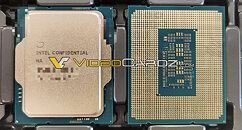Thursday, February 18th 2021

Intel Rocket Lake-S Lands on March 15th, Alder Lake-S Uses Enhanced 10 nm SuperFin Process
In the latest round of rumors, we have today received some really interesting news regarding Intel's upcoming lineup of desktop processors. Thanks to HKEPC media, we have information about the launch date of Intel's Rocket Lake-S processor lineup and Alder Lake-S details. Starting with Rocket Lake, Intel did not unveil the exact availability date on these processors. However, thanks to HKEPC, we have information that Rocket Lake is landing in our hands on March 15th. With 500 series chipsets already launched, consumers are now waiting for the processors to arrive as well, so they can pair their new PCIe 4.0 NVMe SSDs with the latest processor generation.
When it comes to the next generation Alder Lake-S design, Intel is reported to use its enhanced 10 nm SuperFin process for the manufacturing of these processors. This would mean that the node is more efficient than the regular 10 nm SuperFin present on Tiger Lake processors, and some improvements like better frequencies are expected. Alder Lake is expected to make use of big.LITTLE core configuration, with small cores being Gracemont designs, and the big cores being Golden Cove designs. The magic of Golden Cove is expected to result in 20% IPC improvement over Willow Cove, which exists today in Tiger Lake designs. Paired with PCIe 5.0 and DDR5 technology, Alder Lake is looking like a compelling upgrade that is arriving in December of this year. Pictured below is the LGA1700 engineering sample of Alder Lake-S processor.
Sources:
HKEPC, via VideoCardz
When it comes to the next generation Alder Lake-S design, Intel is reported to use its enhanced 10 nm SuperFin process for the manufacturing of these processors. This would mean that the node is more efficient than the regular 10 nm SuperFin present on Tiger Lake processors, and some improvements like better frequencies are expected. Alder Lake is expected to make use of big.LITTLE core configuration, with small cores being Gracemont designs, and the big cores being Golden Cove designs. The magic of Golden Cove is expected to result in 20% IPC improvement over Willow Cove, which exists today in Tiger Lake designs. Paired with PCIe 5.0 and DDR5 technology, Alder Lake is looking like a compelling upgrade that is arriving in December of this year. Pictured below is the LGA1700 engineering sample of Alder Lake-S processor.

82 Comments on Intel Rocket Lake-S Lands on March 15th, Alder Lake-S Uses Enhanced 10 nm SuperFin Process
You lads like to shit on Intel for everything they do, but they managed to be competitive for five years on revisions of the same process which is a testament to their engineers.
It's been proven time again that Intels 14nm++ is as good as other companies 10nm, and their 10nm+ is as good as TSMC 7nm.
Calm down and understand all the "nm" numbers are just marketing numbers and don't reflect actual transistor measurements. What's important is the performance.
I remember going into DDR3 hype, just to get stuck at awful 1033mhz CL13 speeds and paying 150€ for 8gb kit. 2 years down the road and 1666mhz CL8 cost 50€ for 2x4gb kits.
Didnt learn my lesson and jumped to DDR4 day 1, paying 200€ for 2x4gb 2400mhz CL18. 2 years later and 3200mhz CL16 was the norm, Costing 100€ for 2x4gb.
No way Im Jumping on DDR5, buying the first kits for a lot of money. Next time I jump to new platform with new RAM, I Will make sure the RAM kits that I buy Will last me that entire DDR5 GEN.
Awful idea to buy new RAM as soon as it gets released. I Will wait for it to mature first.
My 4000/14 kit will probably have better timings/latencies than some DDR5 kits, without the energy saving advantages and at a higher voltage of course.
Intels 14nm is only good for speeds, but not for heat. 10nm has proven to run cooler and more efficient for AMD, why cant Intel provide the same?
Noise, performance and temp fixed.
Edit:My bad. Looked at the OC number for 5800X.
25W is not too bad of a difference either, though.
RL has something like a 19% IPC performance improvement over its predecessor and AL will be another similar amount over RL, so by waiting it out, you're looking at a 40-50% improvement over the current generation. That's well worth the wait in my book.
Look, I've got an ancient 2700K paired with a 2080 SUPER which can still play all my games very well. Even CoD:MW plays smoothly, although it doesn't reach the highest 144Hz framerate that I would like, so there's no urgency there. For newer CPUs, the need to upgrade is even less compelling. You may need the newer mobo and CPU features, but that's another story.
Additionally Zen cpus have been shown to boost adaptively based on temperatures even without manual oc.
So just like CPU power consumption is irrelevant as long as you have a desktop PC. "Your words bro", temp is irrelevant as long as you have good cooling solution in your desktop PC.And to add to this, NO OC IS Guaranteed. The boost for 5800x up to 4.7Ghz, on the other hand, is within the range of temperature spec given by AMD. If you hit 70 or 80c you will still boost to 4.7Ghz. The temp does not make it run below specification. It can run higher though but that depends on the silicon quality.